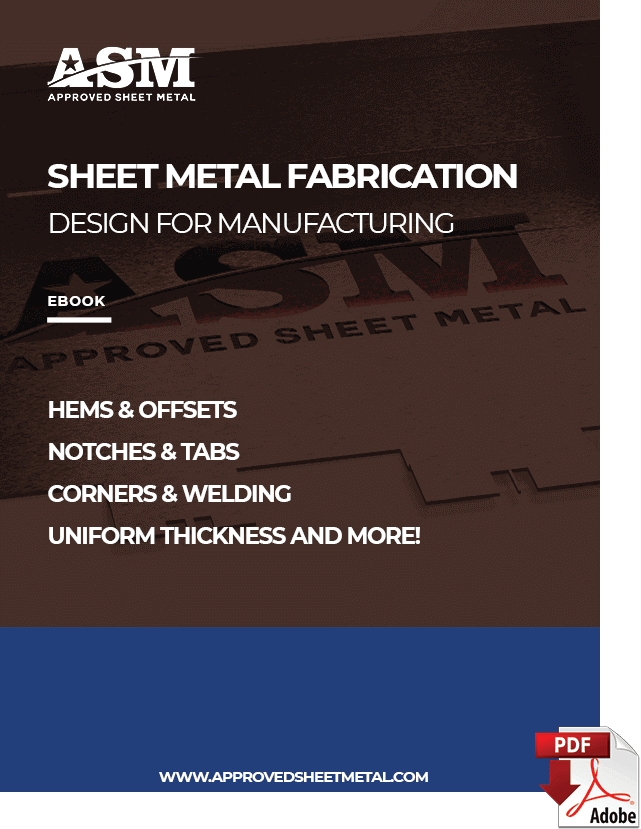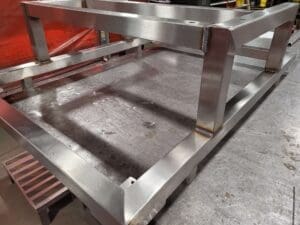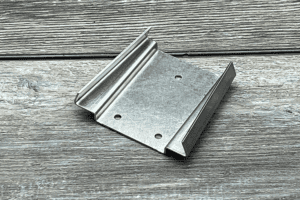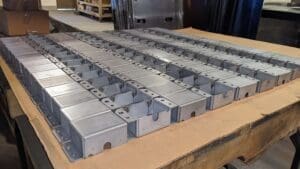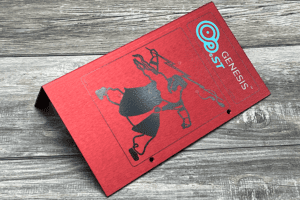Last updated on January 7th, 2026 at 11:27 am
If you’re accustomed to selecting 6061-T6 aluminum for machining, you may find yourself automatically requesting that same material for your sheet metal parts. But 6061 aluminum isn’t typically the best choice for a sheet metal part. For aluminum fabrication, we usually recommend 5052-H32 instead.
Here, we’ll outline the differences between 6061 and 5052 and explain why 5052 is the superior choice for sheet metal fabrication.
Table of Contents
- 1 Which Alloy Is Best for Sheet Metal Fabrication?
- 2 Key Differences Between 6061-T6 vs. 5052-H32 Aluminum
- 3 Why Temper Matters as Much as the Alloy
- 4 Sheet Metal Design for Manufacturing
- 5 5052-H32 Versus 6061-T6 for Sheet Metal Fabrication FAQ
- 5.0.1 What are the key differences between 6061-T6 and 5052-H32 aluminum for sheet metal fabrication?
- 5.0.2 Why is 5052-H32 preferred over 6061-T6 for fabricated parts?
- 5.0.3 What are the primary considerations when choosing between 6061-T6 and 5052-H32 for aluminum fabrication?
- 5.0.4 Are there specific applications where 6061-T6 or 5052-H32 excel over the other?
- 5.0.5 What should be done when 6061-T6 is the specified material but concerns exist about its fabrication suitability?
Which Alloy Is Best for Sheet Metal Fabrication?
Although both 5052-H32 and 6061-T6 aluminum are lightweight, strong, and corrosion resistant, they serve different purposes in fabrication. For most sheet metal parts, especially those requiring tight bends, welding, and formability, 5052-H32 is the superior choice. In contrast, 6061-T6 excels in machined or structural components where high strength and surface finish are priorities but extensive forming is limited. This distinction is key when designing parts for fabrication versus machining.
Key Differences Between 6061-T6 vs. 5052-H32 Aluminum
While both aluminum alloys are lightweight, strong, corrosion-resistant, and weldable (with some potential for heat deformation), the two materials are not interchangeable.
| Property | 5052-H32 | 6061-T6 |
|---|---|---|
| Formability | Excellent — ideal for bends and formed features | Fair — prone to cracking without larger radii or softening |
| Weldability | Very Good — excellent for welded seams | Good — heat-affected zone can reduce strength |
| Fatigue Strength | Higher — resists cyclic stress better | Lower — stronger but less elastic under repeated load |
| Machinability | Lower — softer material may gum up tools | Excellent — easy to machine with tight tolerances |
| Corrosion Resistance | Excellent — performs well in marine environments | Good — resists corrosion but less than 5052 |
| Cost | Lower — generally more cost-effective | Higher — more expensive per pound |
Why Temper Matters as Much as the Alloy
In aluminum selection, the temper (such as H32 or T6) affects material performance just as much as the underlying alloy. Temper describes how the metal is processed, through cold work or heat treatment, which alters its strength, ductility, and formability. For example, 5052-H32 maintains good elasticity and fatigue resistance without heat treatment, making it easier to form without cracking. In contrast, 6061-T6 is heat-treated for high strength but has less ductility, so it may crack at tight bend radii unless softened or post-processed. Understanding both alloy and temper ensures parts behave predictably in fabrication.
Choose 6061-T6 for machined parts
6061-T6 aluminum is heat-treated and very hard, so it machines beautifully!
However, 6061 does not play well with forming processes, as the alloy is highly likely to crack when formed to 90 degrees or beyond. If you must have a 6061 aluminum part with a 90-degree bend, we recommend making the internal radii equal to at least 2x to 3x the material thickness.
Cosmetic issues such as scratches and dents are also considerations when using 6061-T6 for aluminum fabrication. These cosmetic concerns can be managed, but be aware that fixing surface blemishes may increase both cost and lead time.
The properties of 6061-T6 aluminum include:
- Yield strength: 241 MPa (35,000 psi)
- Ultimate tensile strength: 290 MPa (42,000 psi)
- Primary alloying elements: magnesium and silicon
Common applications for 6061-T6 include:
- Aerospace
- Aircraft
- Bridges
- Rivets
- Train cars
- Towers
- Transportation operations
- Vehicle frames

